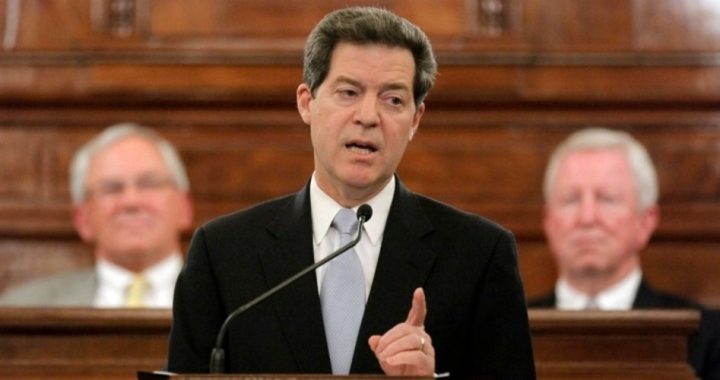
A conservative coalition led by Republican Governor Sam Brownback routed moderate incumbents in Kansas GOP Senate primary races on Tuesday, August 7, giving the Topeka State House a strong rightward tilt in one of the nation’s most solidly Republican states.
Senate President Steve Morris of Hugoton was among the eight moderates who fell to conservative opponents in an intra-party struggle marked by disputes over taxes, state employee benefits, health care, and other issues that have divided the party since the 2010 elections that swept Brownback into the governor’s office and left Republicans in control of both houses of the legislature. Morris, a 20-year veteran of the state senate, was defeated by conservative state Rep. Larry Powell. Just six moderate Republicans won renomination, while the only conservative senator unseated was Dick Kelsey of Goddard, who lost to another conservative, Dan Kerschen of Garden Plain. Republicans currently hold 27 of the 40 seats in the Kansas Senate.
Brownback took the unusual step of targeting several incumbents of his own party for defeat in a year that saw moderate Republicans joining Democrats in opposing the governor’s tax cut plan that will lower taxes on individuals and eliminate the income tax on businesses in the state to stimulate economic growth. Opponents argued the tax cuts favor the wealthy and will lead to budget shortfalls and cutbacks in funding for education and social services. The tax bill passed and will take effect next year, but a coalition of Democrats and moderate Republicans blocked efforts to give the governor more control over appellate court appointments and legislation that would put new public service employees on a private 401(k)-style pension plan instead of the state retirement system.
The targeted Republican incumbents received support from the state’s largest teachers and labor groups usually aligned with Democrats, and outspent their conservative opponents by 3-1 or more, the Associated Press reported. Former Governor Bill Graves was among those holding fundraisers for some of the Republican moderates. The Kansas Chamber of Commerce and the anti-tax group, Americans for Prosperity, supported the conservative candidates in races that featured spending in the hundreds of thousands by candidates and political action committees.
The Affordable Care Act came into play during the primary races as some of the conservative candidates attacked their moderate rivals for opposing legislation to permit Kansas to drop out of the controversial healthcare overhaul, commonly known as ObamaCare. A Chamber of Commerce flier labeled Pete Brungardt, a moderate senator from central Kansas, “Obama’s best friend in the Kansas Senate.” Brungardt lost to conservative Republican Tom Arpke. A mailing in the suburban Kansas City district represented by Sen. Tim Owens said, “Obama sought a robot, and found one.” Owens was defeated Tuesday by conservative Rep. Jim Denning. “And they’ve got Obama and me, which is absolutely ridiculous,” Owen said in a recent interview aired on National Public Radio.
Some Democrats switched their party registration to vote in the Republican primary and oppose what some have called a radical Republican agenda. Richard and Joey Giblin of Sedgwick were among those who jumped parties to vote for the GOP moderates. “The fact that the Brownback administration is trying to control all three branches of government was the factor in our switching parties,” Richard Giblin told the AP.
Jeff Melcher, a conservative Republican who defeated Rep. Pat Colloton in the senate district 11 primary said the conservative victories indicate the direction Republican voters want the state to follow. “We really are just better aligned with the electorate than ever before,” Melcher, who owns an information technology business, told the Kansas City Star. “We really don’t need a Democratic wing of our party.”
Photo of Kansas Governor Sam Brownback: AP Images



